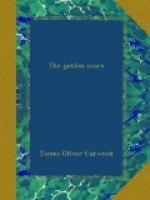Under it all, in Philip’s mind, ran the thought of the woman’s hair. In Pierre Breault’s cabin he had not given voice to the suspicion that had flashed upon him. He had kept it to himself, and Pierre, afraid to speak because of the horror of it, had remained as silent as he. The thought oppressed him now. He knew that human hair retained its life and its gloss indefinitely, and that Bram might have had the golden snare for years. It was quite reasonable to suppose that he had bartered for it with some white man in the years before he had become an outlaw, and that some curious fancy or superstition had inspired him in its possession. But Philip had ceased to be influenced by reason alone. Sharply opposed to reason was that consciousness within him which told him that the hair had been freshly cut from a woman’s head. He had no argument with which to drive home the logic of this belief even with himself, and yet he found it impossible not to accept that belief fully and unequivocally. There was, or had been, a woman with Bram—and as he thought of the length and beauty and rare texture of the silken strand in his pocket he could not repress a shudder at the possibilities the situation involved. Bram—and a woman! And a woman with hair like that!
He left his tree after a time. For another hour he paced slowly back and forth at the edge of the Barren, his senses still keyed to the highest point of caution. Then he rebuilt his fire, pausing every few moments in the operation to listen for a suspicious sound. It was very cold. He noticed, after a little, that the weird sound of the lights over the Pole had become only a ghostly whisper. The stars were growing dimmer, and he watched them as they seemed slowly to recede farther and farther away from the world of which he was a part. This dying out of the stars always interested him. It was one of the miracles of the northern world that lay just under the long Arctic night which, a few hundred miles beyond the Barren, was now at its meridian. It seemed to him as though ten thousand invisible hands were sweeping under the heavens extinguishing the lights first in ones and twos and then in whole constellations. It preceded by perhaps half an hour the utter and chaotic blackness that comes before the northern dawn, and it was this darkness that Philip dreaded as he waited beside his fire.
In the impenetrable gloom of that hour Bram might come. It was possible that he had been waiting for that darkness. Philip looked at his watch. It was four o’clock. Once more he went to his tree, and waited. In another quarter of an hour he could not see the tree beside which he stood. And Bram did not come. With the beginning of the gray dawn Philip rebuilt his fire for the third time and prepared to cook his breakfast. He felt the need of coffee—strong coffee—and he boiled himself a double ration. At seven o’clock he was ready to take up the trail.




